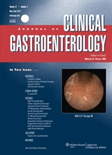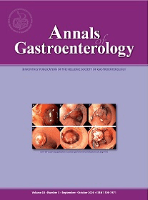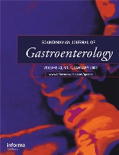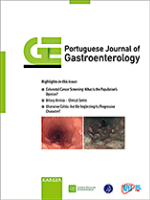
JOURNAL OF CLINICAL GASTROENTEROLOGY
Scope & Guideline
Advancing gastrointestinal health through groundbreaking research.
Introduction
Aims and Scopes
- Clinical Research and Trials:
The journal prioritizes research that evaluates clinical outcomes related to gastrointestinal diseases, including studies on pharmacological interventions, surgical techniques, and endoscopic procedures. - Diagnostic Innovations:
There is a strong emphasis on the development and validation of novel diagnostic tools and techniques, such as imaging modalities and biomarker assessments, to enhance the accuracy of gastrointestinal disease diagnosis. - Pathophysiology and Mechanisms:
Research exploring the underlying mechanisms and pathophysiological aspects of gastrointestinal disorders is a core focus, contributing to a better understanding of disease progression and patient management. - Public Health and Epidemiology:
The journal includes studies on the epidemiology of gastrointestinal diseases, addressing public health issues, healthcare disparities, and the impact of socioeconomic factors on patient outcomes. - Multidisciplinary Approaches:
The scope encompasses multidisciplinary studies that integrate gastroenterology with other fields such as nutrition, psychology, and infectious diseases to provide comprehensive patient care.
Trending and Emerging
- Artificial Intelligence and Machine Learning:
There is a growing trend in utilizing AI and machine learning algorithms for enhancing diagnostic accuracy, predicting treatment outcomes, and personalizing patient care in gastrointestinal diseases. - Gut Microbiome Research:
Research investigating the role of the gut microbiome in health and disease is on the rise, particularly in relation to conditions like inflammatory bowel disease and colorectal cancer. - Telemedicine and Remote Patient Monitoring:
The COVID-19 pandemic has accelerated interest in telemedicine and remote monitoring solutions, leading to an increase in studies assessing their effectiveness in managing gastrointestinal disorders. - Patient-Centered Outcomes and Quality of Life:
Emerging research focuses on patient-reported outcomes and quality of life metrics, emphasizing the importance of patient perspectives in treatment efficacy evaluations. - Health Disparities and Social Determinants of Health:
There is an increasing emphasis on understanding health disparities and the social determinants that affect outcomes in gastrointestinal diseases, reflecting a broader public health perspective.
Declining or Waning
- Traditional Pharmacotherapy Studies:
Research centered on older pharmacological treatments for gastrointestinal diseases, such as traditional proton pump inhibitors, has seen a decline as newer therapies and personalized medicine approaches gain traction. - Conventional Surgical Techniques:
While surgical research remains relevant, there is a noticeable decrease in studies focusing solely on traditional surgical methods, as minimally invasive and endoscopic techniques become more prevalent. - Single Disease Focus Studies:
Papers focusing narrowly on a single gastrointestinal condition without considering comorbidities or broader implications are becoming less frequent, indicating a shift towards more integrative and comprehensive research. - Basic Science Research:
There is a waning interest in basic science studies that do not translate directly into clinical applications, as the journal increasingly prioritizes research with immediate clinical relevance. - Static Guidelines and Protocols:
Research that merely reiterates existing clinical guidelines or protocols without new insights or evidence is less represented, reflecting a demand for innovative contributions.
Similar Journals

Gastroenterology Insights
Fostering Collaboration in Gastrointestinal ResearchGastroenterology Insights is a premier open-access journal published by MDPI since 2009, focusing on essential research and developments within the fields of gastroenterology and hepatology. With a dedicated ISSN of 2036-7414 and E-ISSN 2036-7422, this journal serves as a vital platform for disseminating innovative studies and insights pertinent to gastrointestinal health, disorders, and treatment modalities. Based in Switzerland, Gastroenterology Insights boasts a significant academic presence, currently positioned in the Q3 quartile for both gastroenterology and hepatology categories as of 2023, reflecting its impactful contributions to the disciplines. With Scopus rankings placing it at the 94th and 48th positions in gastroenterology and hepatology respectively, the journal is committed to advancing knowledge and fostering collaboration among researchers, professionals, and students alike. By providing an open-access model, it ensures that high-quality research is accessible globally, thereby enhancing the reach and impact of crucial findings in the science of digestive health. Researchers looking to publish cutting-edge work will find Gastroenterology Insights a valuable resource for both sharing and acquiring knowledge.

Canadian Journal of Gastroenterology and Hepatology
Elevating Standards in Gastroenterology and Hepatology ResearchCanadian Journal of Gastroenterology and Hepatology, published by HINDAWI LTD, serves as a vital resource in the fields of gastroenterology and hepatology. Since its inception in 1987, this open-access journal has made significant contributions to advancing research and clinical practice through its comprehensive coverage of topics ranging from liver diseases to gastrointestinal disorders. With an impressive Q2 ranking in Gastroenterology and a Q3 ranking in Hepatology as of 2023, the journal has established itself as an influential platform for researchers and healthcare professionals seeking to disseminate and acquire knowledge. The journal is based in Egypt, with its operational headquarters located in London, England. Notably, it holds a respectable standing in Scopus rankings, placed at Rank #64 in Gastroenterology and Rank #34 in Hepatology, reflecting its impact and relevance in the medical community. With a commitment to quality and accessibility, the Canadian Journal of Gastroenterology and Hepatology continues to foster innovation and collaboration among its readers.

DEN Open
Connecting researchers for a healthier tomorrow.Welcome to DEN Open, a pioneering journal published by WILEY, dedicated to advancing the field of medicine through an open-access model. Established in 2021, this journal serves as a platform for innovative research in various medical disciplines, including surgery, gastroenterology, and internal medicine. With a focus on disseminating high-quality, peer-reviewed articles, DEN Open aims to foster collaboration and knowledge sharing among researchers, professionals, and students worldwide. Despite its early years, the journal has already established itself within the competitive landscape of medical publications, ranking in the 41st and 29th percentiles in its respective Scopus categories. This underscores its commitment to scientific rigor and impact within the realm of medicine. As we converge towards 2025, DEN Open invites submissions that contribute to the evolving dialogue in healthcare, enhancing the intersection of knowledge, practice, and patient care.

Annals of Gastroenterology
Connecting Clinicians and Researchers in GastroenterologyAnnals of Gastroenterology, published by the Hellenic Society of Gastroenterology, serves as a pivotal platform for advancing the field of gastroenterology, highlighting research that spans across the spectrum of gastrointestinal diseases and treatments. With an ISSN of 1108-7471 and E-ISSN of 1792-7463, this journal has established itself as a reputable source of scholarship since its inception in 2000, converging valuable insights through to 2024. Ranking within Q2 of its category and achieving a respectable 78th position out of 167 in the Scopus rankings, the journal holds a strong presence in the academic community, appealing to researchers, clinicians, and students alike. Although not an open access publication, Annals of Gastroenterology is dedicated to disseminating high-quality research that aids in the understanding and treatment of gastrointestinal conditions, making it an essential reference point for those engaged in this dynamic field.

SCANDINAVIAN JOURNAL OF GASTROENTEROLOGY
Advancing Digestive Health Through Rigorous ResearchSCANDINAVIAN JOURNAL OF GASTROENTEROLOGY, published by Taylor & Francis Ltd, is a leading journal in the field of gastroenterology, dedicated to advancing clinical and experimental research related to digestive health. With an ISSN of 0036-5521 and an E-ISSN of 1502-7708, this journal provides a platform for high-quality research that addresses the complexities of gastrointestinal diseases. Since its inception in 1966, the journal has consistently contributed valuable insights and is currently categorized in the Q2 quartile of gastroenterology journals, reflecting its impact and relevance in the field, with a Scopus rank of 87 out of 167 in Medicine - Gastroenterology. Researchers and practitioners are encouraged to explore the journal's archives to enhance their understanding and stay abreast of innovative strategies for managing gastrointestinal disorders. The SCANDINAVIAN JOURNAL OF GASTROENTEROLOGY remains a crucial resource for those committed to improving patient outcomes through rigorous scientific inquiry and the sharing of impactful findings.

JOURNAL OF GASTROENTEROLOGY
Pioneering breakthroughs in digestive health.JOURNAL OF GASTROENTEROLOGY, published by SPRINGER JAPAN KK, is a premier academic journal that has been at the forefront of gastrointestinal research since its inception in 1994. With an impressive Impact Factor and ranking in the top quartile (Q1) of its category, this journal holds a significant place in the field of gastroenterology, currently ranked 12th out of 167 in Scopus, placing it in the 93rd percentile. The journal serves as an essential platform for disseminating innovative research, clinical studies, and reviews that foster advancements in the understanding and treatment of gastrointestinal diseases. Although it does not offer Open Access options, it provides researchers, clinicians, and students access to crucial insights and breakthroughs pivotal to improving patient care and outcomes in gastroenterology. With a commitment to high-quality peer-reviewed content, JOURNAL OF GASTROENTEROLOGY plays a vital role in shaping the future of gastrointestinal health and research.

Frontline Gastroenterology
Transforming Understanding of Gastrointestinal DiseasesFrontline Gastroenterology is a leading academic journal published by the BMJ Publishing Group that plays a vital role in advancing the field of gastroenterology and hepatology. Established in 2013, this prestigious journal has established itself as a significant resource for researchers, healthcare professionals, and students alike, maintaining a commendable impact factor and consistently achieving a Q2 ranking in both gastroenterology and hepatology categories as of 2023. With its focus on disseminating high-quality, peer-reviewed research, Frontline Gastroenterology covers a wide scope of topics pertinent to the understanding, diagnosis, and treatment of gastrointestinal and liver diseases. Although it does not offer Open Access options, its content is accessible through various institutional and personal subscriptions, ensuring that critical findings reach an international audience. As the journal continues to converge into the future, it remains dedicated to fostering innovation and dialogue in gastroenterological sciences.

Pediatric Gastroenterology Hepatology & Nutrition
Fostering collaboration for improved children's health outcomes.Pediatric Gastroenterology Hepatology & Nutrition is a pivotal academic journal published by the Korean Society of Pediatric Gastroenterology & Nutrition, focusing on the critical fields of pediatric gastroenterology, hepatology, and nutrition. Located in South Korea, this journal aims to disseminate high-quality research, review articles, and clinical studies to advance knowledge and practice in the care of children with gastrointestinal and nutritional disorders. With a Converged Years span from 2012 to 2024 and categorized in the Q2 and Q3 quartiles in 2023 across multiple related fields, the journal holds a significant position within the academic community, reflecting its impactful contribution to the discipline. Although currently not open access, the journal ensures that content is accessible to a broad audience through various institutional subscriptions. The journal appeals to researchers, healthcare professionals, and students alike, providing an essential platform for the exchange of innovative ideas and research findings aimed at improving pediatric patient care.

GE Portuguese Journal of Gastroenterology
Exploring Innovations in Digestive HealthThe GE Portuguese Journal of Gastroenterology, published by KARGER, is a prominent platform in the field of gastroenterology, providing a vital forum for the dissemination of high-quality research since its establishment. With an open access model implemented in 2012, the journal ensures that emerging findings in gastrointestinal health are readily accessible to a global audience, facilitating the exchange of critical knowledge among researchers, practitioners, and students alike. Based in Switzerland, this journal has earned a respected position within the academic community, currently holding a Q3 ranking in the gastroenterology category for 2023, alongside a Scopus rank of #113 out of 167 in its field. Spanning converged years from 2014 to 2024, the GE Portuguese Journal of Gastroenterology aims to bridge gaps in research and practice, fostering collaboration and innovation across diverse areas within the discipline. Authors and readers alike benefit from the journal's commitment to advancing knowledge and practice in gastroenterology.

WORLD JOURNAL OF GASTROENTEROLOGY
Leading the way in gastrointestinal research excellence.WORLD JOURNAL OF GASTROENTEROLOGY, published by BAISHIDENG PUBLISHING GROUP INC, stands at the forefront of gastrointestinal research, providing a critical platform for the dissemination of high-quality studies in the field. With an impressive impact factor reflected in its Q1 rankings in both Gastroenterology and Miscellaneous Medicine, this journal is recognized for its rigorous peer-review process and commitment to advancing knowledge and practices related to digestive health. Covering comprehensive scopes from clinical advancements to innovative therapies, the journal serves an essential role for researchers, clinicians, and students, enabling them to stay updated on the latest developments and findings from 1998 through 2024. The open access model facilitates broader accessibility, ensuring that groundbreaking research reaches a global audience. The journal's ranking within the top 15% of Scopus demonstrates its significant contribution to the academic community, making it a valuable resource for advancing the science of gastroenterology.